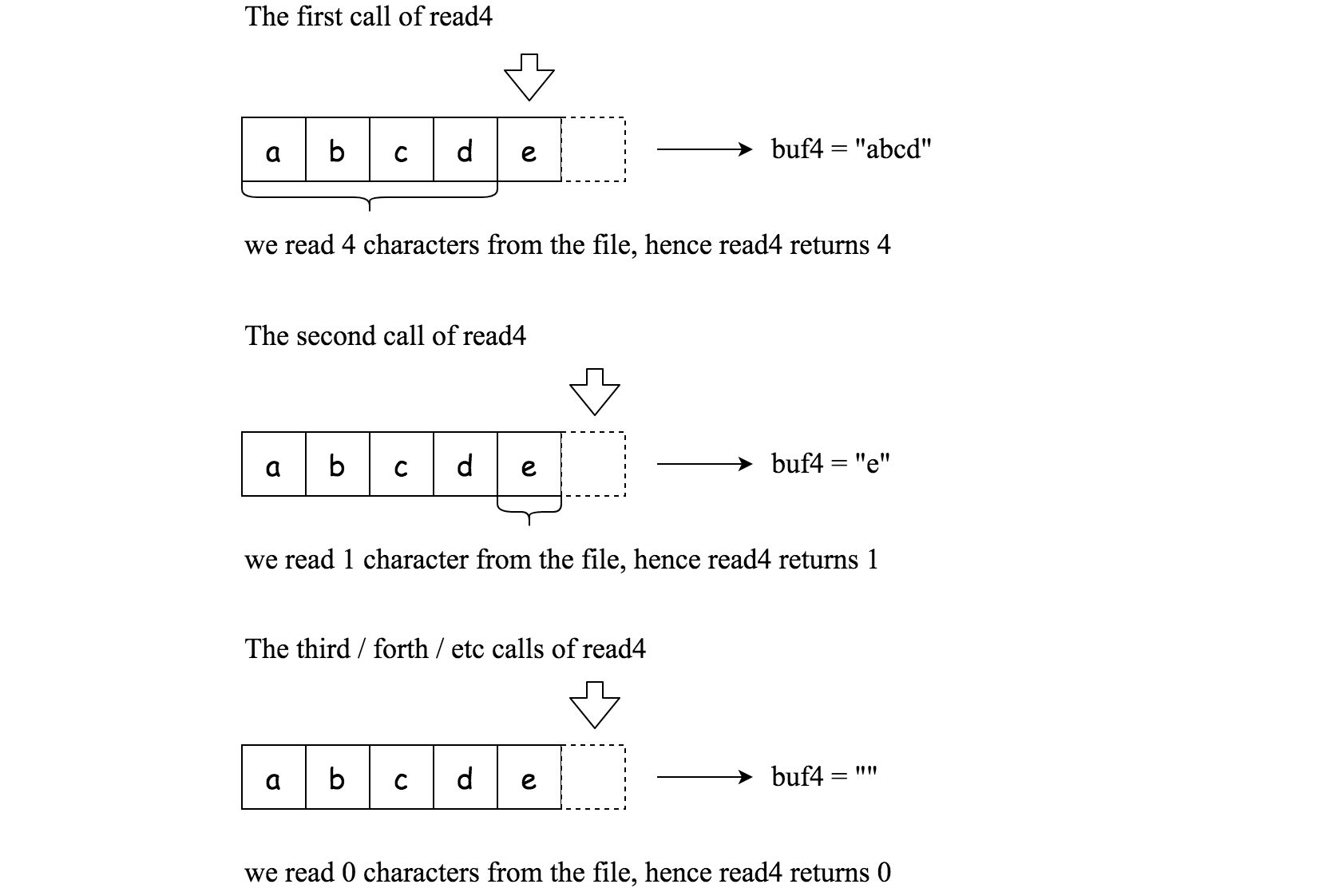Welcome to Subscribe On Youtube
157. Read N Characters Given Read4
Description
Given a file and assume that you can only read the file using a given method read4, implement a method to read n characters.
Method read4:
The API read4 reads four consecutive characters from file, then writes those characters into the buffer array buf4.
The return value is the number of actual characters read.
Note that read4() has its own file pointer, much like FILE *fp in C.
Definition of read4:
Parameter: char[] buf4
Returns: int
buf4[] is a destination, not a source. The results from read4 will be copied to buf4[].
Below is a high-level example of how read4 works:

File file("abcde"); // File is "abcde", initially file pointer (fp) points to 'a'
char[] buf4 = new char[4]; // Create buffer with enough space to store characters
read4(buf4); // read4 returns 4. Now buf4 = "abcd", fp points to 'e'
read4(buf4); // read4 returns 1. Now buf4 = "e", fp points to end of file
read4(buf4); // read4 returns 0. Now buf4 = "", fp points to end of file
Method read:
By using the read4 method, implement the method read that reads n characters from file and store it in the buffer array buf. Consider that you cannot manipulate file directly.
The return value is the number of actual characters read.
Definition of read:
Parameters: char[] buf, int n
Returns: int
buf[] is a destination, not a source. You will need to write the results to buf[].
Note:
- Consider that you cannot manipulate the file directly. The file is only accessible for
read4but not forread. - The
readfunction will only be called once for each test case. - You may assume the destination buffer array,
buf, is guaranteed to have enough space for storingncharacters.
Example 1:
Input: file = "abc", n = 4 Output: 3 Explanation: After calling your read method, buf should contain "abc". We read a total of 3 characters from the file, so return 3. Note that "abc" is the file's content, not buf. buf is the destination buffer that you will have to write the results to.
Example 2:
Input: file = "abcde", n = 5 Output: 5 Explanation: After calling your read method, buf should contain "abcde". We read a total of 5 characters from the file, so return 5.
Example 3:
Input: file = "abcdABCD1234", n = 12 Output: 12 Explanation: After calling your read method, buf should contain "abcdABCD1234". We read a total of 12 characters from the file, so return 12.
Constraints:
1 <= file.length <= 500fileconsist of English letters and digits.1 <= n <= 1000
Solutions
-
/** * The read4 API is defined in the parent class Reader4. * int read4(char[] buf4); */ public class Solution extends Reader4 { /** * @param buf Destination buffer * @param n Number of characters to read * @return The number of actual characters read */ public int read(char[] buf, int n) { char[] buf4 = new char[4]; int i = 0, v = 5; while (v >= 4) { v = read4(buf4); for (int j = 0; j < v; ++j) { buf[i++] = buf4[j]; if (i >= n) { return n; } } } return i; } } -
/** * The read4 API is defined in the parent class Reader4. * int read4(char *buf4); */ class Solution { public: /** * @param buf Destination buffer * @param n Number of characters to read * @return The number of actual characters read */ int read(char* buf, int n) { char buf4[4]; int i = 0, v = 5; while (v >= 4) { v = read4(buf4); for (int j = 0; j < v; ++j) { buf[i++] = buf4[j]; if (i >= n) { return n; } } } return i; } }; -
""" The read4 API is already defined for you. @param buf4, a list of characters @return an integer def read4(buf4): # Below is an example of how the read4 API can be called. file = File("abcdefghijk") # File is "abcdefghijk", initially file pointer (fp) points to 'a' buf4 = [' '] * 4 # Create buffer with enough space to store characters read4(buf4) # read4 returns 4. Now buf = ['a','b','c','d'], fp points to 'e' read4(buf4) # read4 returns 4. Now buf = ['e','f','g','h'], fp points to 'i' read4(buf4) # read4 returns 3. Now buf = ['i','j','k',...], fp points to end of file """ class Solution: def read(self, buf, n): """ :type buf: Destination buffer (List[str]) :type n: Number of characters to read (int) :rtype: The number of actual characters read (int) """ i = 0 buf4 = [0] * 4 v = 5 while v >= 4: v = read4(buf4) for j in range(v): buf[i] = buf4[j] i += 1 if i >= n: return n return i -
/** * The read4 API is already defined for you. * * read4 := func(buf4 []byte) int * * // Below is an example of how the read4 API can be called. * file := File("abcdefghijk") // File is "abcdefghijk", initially file pointer (fp) points to 'a' * buf4 := make([]byte, 4) // Create buffer with enough space to store characters * read4(buf4) // read4 returns 4. Now buf = ['a','b','c','d'], fp points to 'e' * read4(buf4) // read4 returns 4. Now buf = ['e','f','g','h'], fp points to 'i' * read4(buf4) // read4 returns 3. Now buf = ['i','j','k',...], fp points to end of file */ var solution = func(read4 func([]byte) int) func([]byte, int) int { // implement read below. return func(buf []byte, n int) int { buf4 := make([]byte, 4) i, v := 0, 5 for v >= 4 { v = read4(buf4) for j := 0; j < v; j++ { buf[i] = buf4[j] i++ if i >= n { return n } } } return i } }